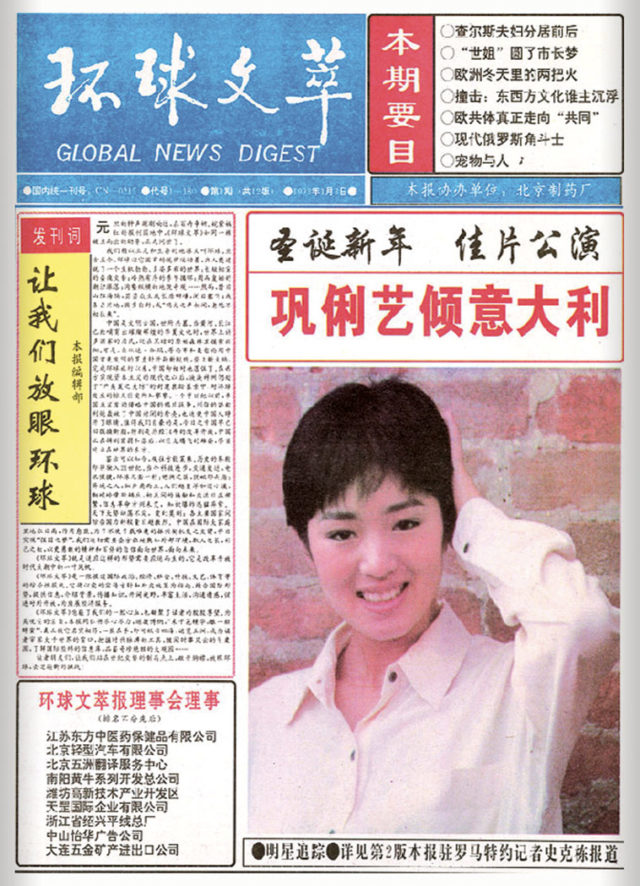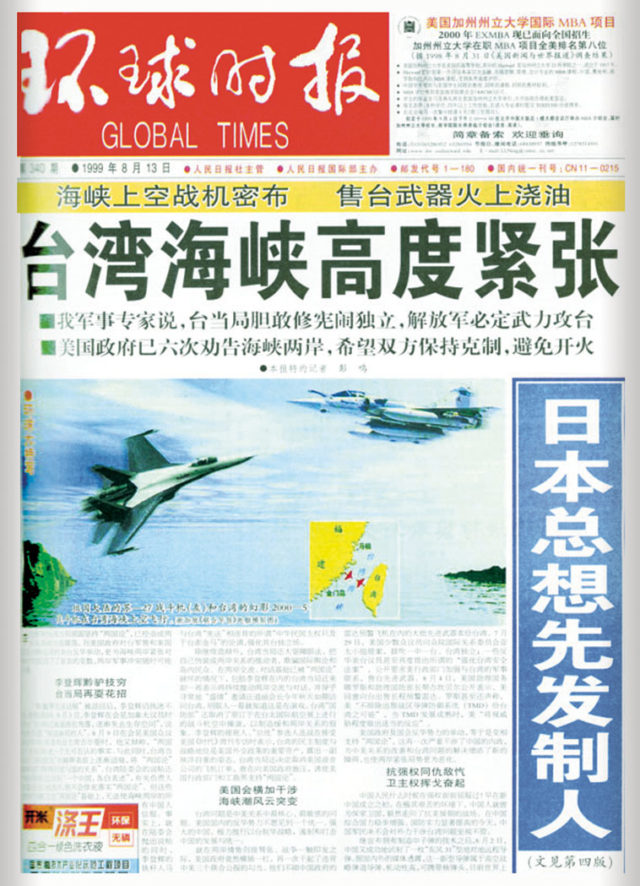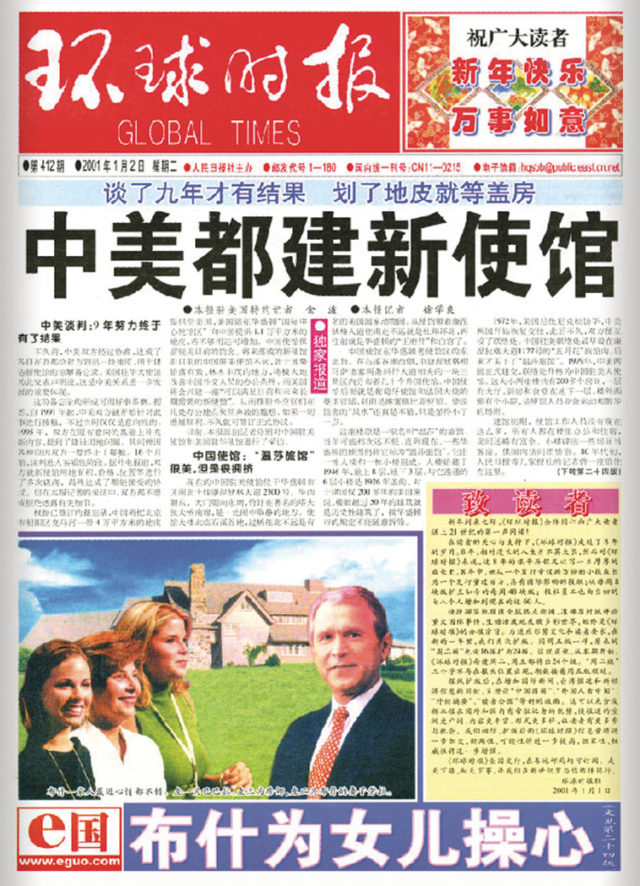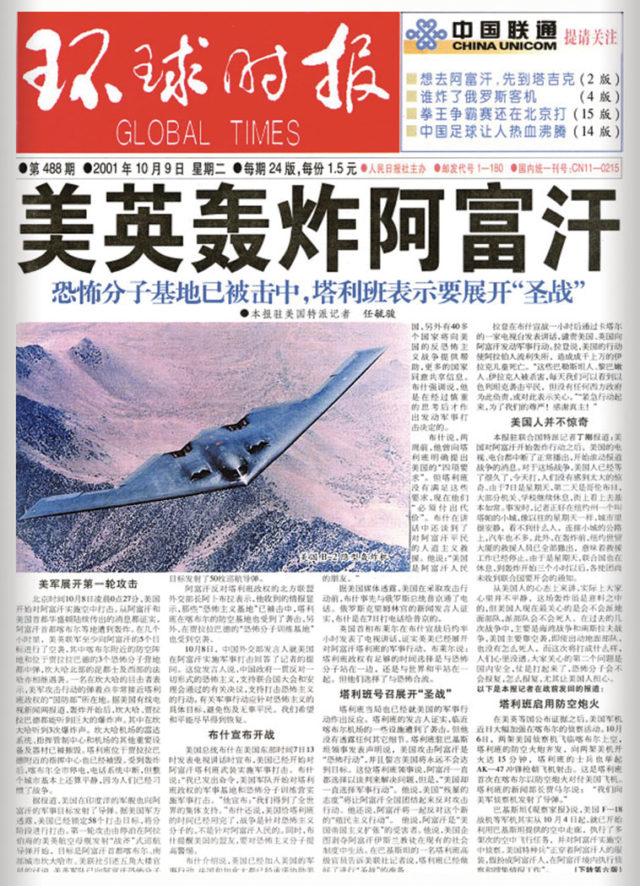In 1993, the People’s Daily, the venerable Communist Party mouthpiece, founded the Global Times — a tabloid-format newspaper that soon became known for its nationalistic take on world affairs that was part of its commercial strategy. The People’s Daily media group was one of the earliest in China to experiment with the market. Previously, in 1981, it had established the English-language China Daily in collaboration with The Age newspaper in Australia. Then, in 1995, a company within the group entered into a joint venture with Rupert Murdoch’s News Corp to build an IT business in China. Three years later, an affiliated advertising agency established a joint venture with Beijing Scene — a small American-run entertainment magazine that other arms of the Chinese government had frequently shut down. But while the joint ventures with News Corp and Beijing Scene came to nothing, Global Times prospered.
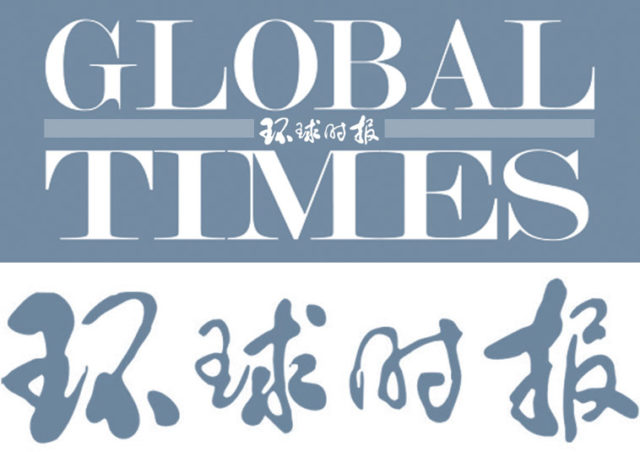 In April 2012, the outspoken editor-in-chief of the Global Times, Hu Xijin, declared on his Sina Weibo microblog that print circulation of the paper had reached record highs and website traffic was continuing to grow. The Global Times currently boasts a daily circulation of two million copies — a high figure for a Chinese newspaper.
In April 2012, the outspoken editor-in-chief of the Global Times, Hu Xijin, declared on his Sina Weibo microblog that print circulation of the paper had reached record highs and website traffic was continuing to grow. The Global Times currently boasts a daily circulation of two million copies — a high figure for a Chinese newspaper.
Since Hu took over from the founding editor He Chongyuan in 2005, he has perfected a formula of short, colloquial articles on global events, some of which are written by correspondents abroad but many of which are simply digested from foreign news reports. Where stories concern China’s interactions with other countries, the paper is unabashedly nationalistic, defensive of Communist Party rule and occasionally egregiously jingoistic.
In 2009, the Global Times launched an English edition focussing on news from and about China. Hu Xijin frequently claims that the Chinese version of the newspaper reports on a ‘multipolar world’ (duoyuande shijie 多元的世界), while the English edition tells the stories of a ‘complicated China’ (fuzade Zhongguo 复杂的中国).
Internet activists regularly mock Hu for being China’s ‘biggest Fifty Cent Party Member’ — a reference to the ‘Fifty-cent Party’ made up of netizens supposedly paid fifty (Chinese) cents for each online comment they make supporting the government and its policies. As reported in the 2012 Yearbook, shortly after the arrest of dissident artist Ai Weiwei on 3 April 2011, Richard Burger — formerly a foreign editor at the English-language Global Times — wrote a blog post at Pekingduck.org describing a staff meeting at which Hu Xijin ordered his journalists to visit online forums and social media sites and leave comments following the party line of criticising Ai Weiwei.
Hu has almost four million followers on Weibo, and many defenders. But the sarcastic, anti-propaganda culture of Sina Weibo is not always welcoming of him. The comments on his postings are often scathing, with people decrying him as a dog, an arse-kisser and far worse. Such criticism generally goes uncensored. Hu argues on his Weibo account and in editorials that people on Weibo and ‘public intellectuals’ critical of the Party tend to be sanctimonious, but that the vast majority of Chinese people agree with how the government operates and they understand that China is a ‘complicated’ country. In tone, style and commercial popularity, Hu represents a Chinese version of Australia’s Alan Jones or America’s Rush Limbaugh.
Below are summaries of key Global Times editorials and articles published in 2012 and early 2013.
SELECT GLOBAL TIMES EDITORIALS, 2012-2013
JANUARY 2012
Anniversary of the Return of Hong Kong to Chinese Sovereignty in 1997
The Global Times praised the achievements of Hong Kong and emphasised the role of Beijing in ensuring the former colony’s prosperity. The paper also recognised that not all Hong Kong residents feel the same: an editorial published on 20 January was titled ‘Reunified for 15 years, it seems Hong Kongers’ hearts have not come home’
(香港回归已近15年,港人心态似未回归).
JULY 2012
Bogu Kailai: Everyone equal
before the law
On 27 July, the day after Bo Xilai’s wife Gu Kailai (aka Bogu Kailai, as state media referred to her after Bo’s fall), the Global Times ran an editorial entitled ‘Everyone is an ordinary person when facing criminal punishment’ (任何人走上刑事被告席都是普通人).
SEPTEMBER 2012
Views on Hong Kong
An editorial published on 11 September argued that Mainlanders should view Hong Kong politics with a detached attitude. If the future of a rising Hong Kong involves a desire to cause political trouble for the Mainland, this will naturally be a bad thing. But the Mainland has a lot of economic leverage with Hong Kong, and any Hong Kong resistance to the Mainland is futile.
JANUARY 2013
Southern Weekly’s Censored
New Year Editorial
Published in response to the Southern Weekly incident (see the Introduction for more on this), a Global Times editorial insisted that even in Western countries mainstream media does not openly challenge the government, and that this attempt in China was doomed to failure. This editorial expressed the Global Times’ vehement opposition to constitutionalism in China: ‘“Constitutional governance” is a Roundabout Way to Negate China’s Development’
(‘宪政’是兜圈子否定中国发展之路).
APRIL 2013
The Death of Margaret Thatcher
An editorial published on 9 April following the death of former UK Prime Minister Margaret Thatcher reflected upon the history of her negotiations with Deng Xiaoping over the future of Hong Kong, concluding that she ‘removed what remained of the power of the British Empire’ (撒切尔夫人带走了大英帝国的余威).
Diaoyu Islands
The Global Times has published numerous editorials on the Diaoyu/Senkaku Islands issue. A report on 24 July 2012 stated that the landing of US aircraft at US bases in Japan was designed to assist Japan’s defence of the Diaoyu Islands, while a piece on 25 July ridiculed the Japanese government’s ‘purchase’ of the islands. On 15 October, an editorial blamed the US for complicating the issue (美国让钓鱼岛问题变得暧昧) and a 3 December article warned the US not to ‘play with fire’ (别拿钓鱼岛问题玩儿火).
A BRIEF ACCOUNT OF THE GLOBAL TIMES
The People’s Daily launches Global News Digest (Huanqiu wencui 环球文萃) — a weekly eight-page tabloid-format newspaper. The first issue features a large colour photo of the actress Gong Li on the cover and an editorial introducing the newspaper with the slogan ‘Let’s take a global perspective’ (让我们放眼环球).
5 JANUARY 1993
The newspaper changes its name to Global Times (环球时报 Huanqiu shibao) and expands to sixteen pages.
SEPTEMBER 1997
The Global Times publishes a sincere and moving article on the death of Princess Diana. Circulation exceeds 280,000 copies.
The Global Times scoops the news that Kim Jong-il has finally assumed the role of General Secretary of the Workers’ Party of Korea and successfully predicts the date of his assumption of power later in the month.
The second major headline is ‘Saudi Arabia to behead British nurse’.
4 JANUARY 1998
The Global Times is first with the news of the establishment of diplomatic relations between China and South Africa.
JUNE 1998
Global Times journalists track US President Bill Clinton’s visit to China, drawing much attention from the foreign press.
21 June 1998 headlines:
- ‘China experts [in America] talk about Bill Clinton’s China visit’
- ‘US military used toxic gas to eliminate traitors’ (in reference to a report in CNN and Time that the US military acknowledged it had used gas to kill US army deserters in the Vietnam War).
1 JANUARY 1999
The Global Times expands to twenty-four pages and begins printing full colour photographs on some pages.
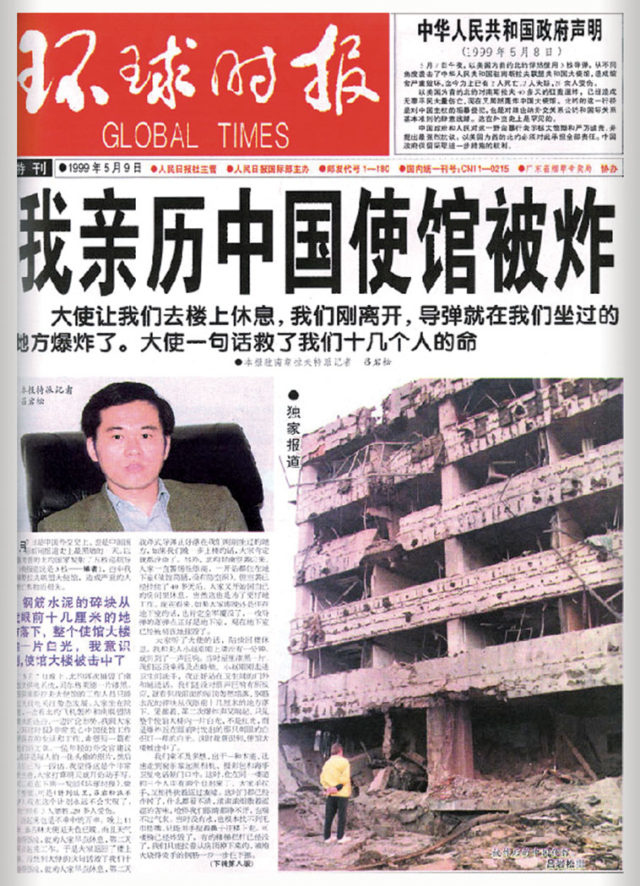 APRIL–MAY 1999
APRIL–MAY 1999
The Global Times tracks the Kosovo war with its own correspondents on location, establishing the newspaper as a leader among Chinese media in reporting international news.
The Global Times publishes a special issue with an exclusive eyewitness account of the NATO bombing of the Chinese Embassy in Belgrade. The article is reprinted by many newspapers nationwide. The circulation of this issue reaches 780,000.
Headline: ‘Eyewitness account of the bombing of the Chinese embassy [in Belgrade]’.
JULY–SEPTEMBER 1999
The Global Times publishes eight front-page reports criticising the ‘Two Country Theory’ (liangguolun 两国论) of former Taiwan president Li Teng-hui. Circulation reaches 1.48 million.
Headlines:
- ‘Tense atmosphere in Taiwan Straits’
- ‘Japan always aims to strike the first blow’.
 4 JANUARY 2000
4 JANUARY 2000
A report on the resignation of Boris Yeltsin appears on the front page of the first issue of the New Year.
The Global Times now starts to appear twice-weekly in sixteen-page editions.
Headline: ‘Yeltsin wisely gives up the throne’.
2 JANUARY 2001
Global Times’ twice-weekly editions expand to twenty-four pages.
Headlines:
- ‘Both America and China are constructing new embassy buildings’
- ‘George Bush concerned about his daughters’.
5 JANUARY 2001
Headlines:
- ‘Bill Clinton packs his bags’ (photo shows Bill and Hilary Clinton cooking)
- ‘The Taiwan authorities put on a show in Quemoy’.
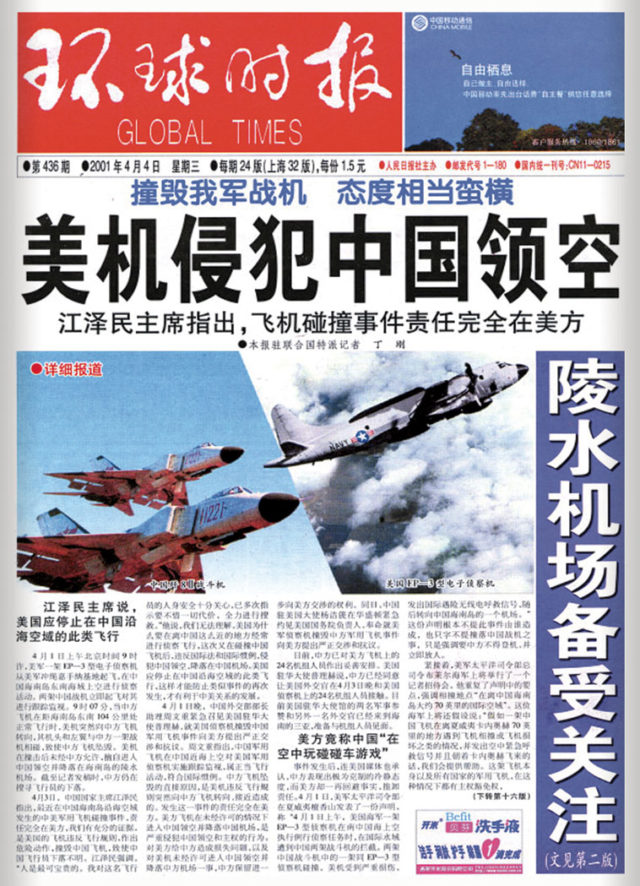 4 APRIL 2001
4 APRIL 2001
The Global Times carries in-depth reports and pictures of the EP-3 incident (a US surveillance plane collided with a Chinese fighter jet over the South China Sea), which are reprinted by media worldwide.
Headlines:
- ‘American aircraft violated China’s airspace’
- ‘All eyes on Lingshui Airport’.
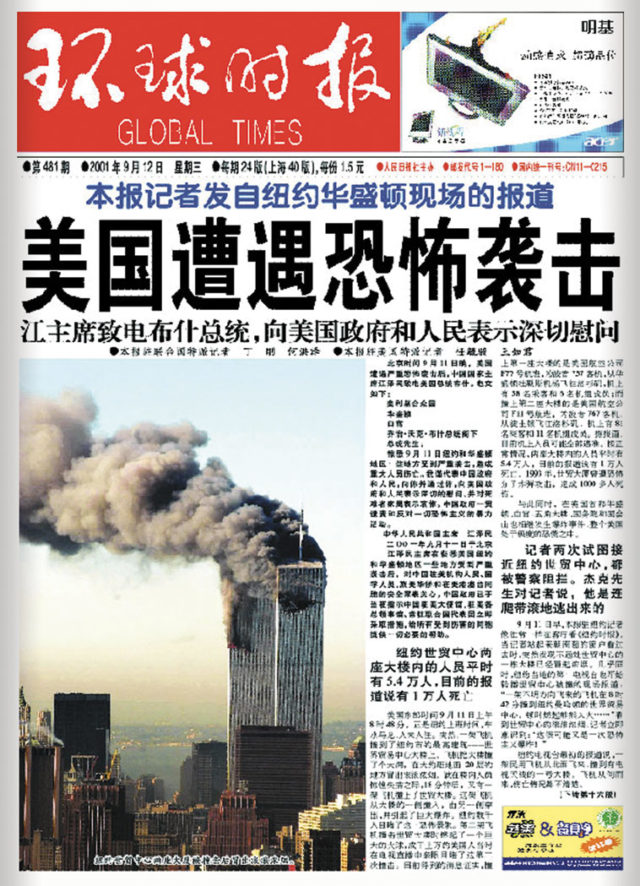 12 SEPTEMBER 2001
12 SEPTEMBER 2001
Due to the front-page report ‘Terror attacks hits the United States’, the circulation of the Global Times reaches 1.96 million.
The circulation of this issue of the Global Times with reports of British and American bombers over Afghanistan reaches two million.
Headline: ‘US and UK bomb Afghanistan’.
JUNE–JULY 2002
The Global Times publishes a special issue on the football World Cup held in South Korea and Japan.
1 JANUARY 2003
The Global Times begins publishing three twenty-four page issues per week on Mondays, Wednesdays and Fridays.
The Global Times sends journalists to the Gulf to report on the Iraq war.
5 AUGUST 2003
The first Life Weekly supplement is published; subsequently one issue per week of twenty-four pages.
2 JANUARY 2004
Front-page article examines the situation across the Taiwan Straits.
AUGUST 2004
Special issue on the Olympic Games in Athens, Greece


